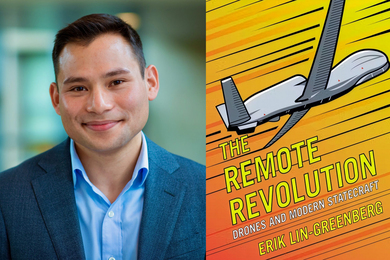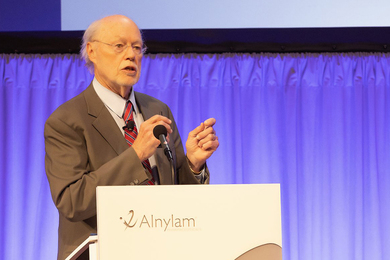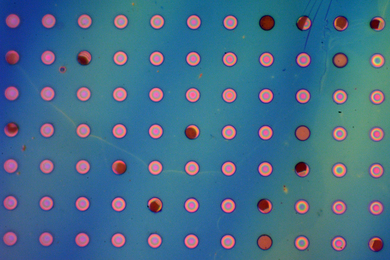The Pew Charitable Trusts this week named Jeff Gore, MIT assistant professor of physics, and Mary Gehring, assistant professor of biology and member of the Whitehead Institute for Biomedical Research, as 2011 Pew Scholars in the Biomedical Sciences. The program encourages early career scientists to pursue research that leads to important medical breakthroughs and treatments.
Scholars receive $240,000 over four years and gain inclusion into a select community of scientists that includes three Nobel Prize winners, three MacArthur Fellows and two recipients of the Albert Lasker Medical Research Award. Twenty-two recipients were named this year.
To date, the program has invested more than $125 million to fund more than 500 scholars. Applicants, who work in all areas of physical and life sciences related to biomedical study, must be nominated by one of 175 invited institutions and demonstrate both excellence and innovation in their research.
“Pew is pleased to provide this country’s most ambitious and dedicated scientists with timely funding that enables them to explore novel areas of investigation early in their careers, at what may be the most inventive and creative period in their research,” said Rebecca W. Rimel, president and CEO of The Pew Charitable Trusts.
Gore completed his PhD in physics at the University of California at Berkeley in 2005. He conducted his postdoctoral training at MIT and then joined the faculty as an assistant professor of physics in 2010.
Gore is exploring how bacteria can cooperate to break down antibiotics. Antibiotic resistance is a growing medical concern, so understanding how bacteria thwart our therapeutic arsenal is of prime interest to scientists and physicians alike. Many penicillin-resistant microbes produce an enzyme that degrades the antibiotic. But Gore has discovered that a population of bacteria must work together to inactivate enough of the drug to allow any of the cells to grow. That observation raises the intriguing possibility that within these populations, “cheaters” could arise: cells that can’t digest penicillin themselves, but that take advantage of the drug-free zone generated by their antibiotic-resistant peers. The rise of such freeloaders, he posits, could limit the spread of antibiotic resistance.
By combining precise measurements of bacterial growth with computer models of game theory (a branch of mathematics that predicts the behavior of individuals in social settings), Gore will gain insight into the dynamics of cooperation and cheating as they relate to evolution of antibiotic resistance. His work holds promise for new approaches for preserving the therapeutic power of antibiotics.
Gehring earned her PhD at the University of California at Berkeley in 2005, followed by a stint as a postdoctoral research associate at the Fred Hutchinson Cancer Research Center. She joined the MIT faculty as an assistant professor of biology in the fall of 2010.
Gehring studies epigenetics, heritable information that influences genome function but is not encoded in DNA. A properly patterned epigenome is critical for developmental and reproductive success in a diverse array of organisms. Gehring uses genetic, genomic and molecular biology approaches to study aspects of epigenomic reprogramming during plant reproduction primarily in the model plant Arabidopsis thaliana.
Scholars receive $240,000 over four years and gain inclusion into a select community of scientists that includes three Nobel Prize winners, three MacArthur Fellows and two recipients of the Albert Lasker Medical Research Award. Twenty-two recipients were named this year.
To date, the program has invested more than $125 million to fund more than 500 scholars. Applicants, who work in all areas of physical and life sciences related to biomedical study, must be nominated by one of 175 invited institutions and demonstrate both excellence and innovation in their research.
“Pew is pleased to provide this country’s most ambitious and dedicated scientists with timely funding that enables them to explore novel areas of investigation early in their careers, at what may be the most inventive and creative period in their research,” said Rebecca W. Rimel, president and CEO of The Pew Charitable Trusts.
Gore completed his PhD in physics at the University of California at Berkeley in 2005. He conducted his postdoctoral training at MIT and then joined the faculty as an assistant professor of physics in 2010.
Gore is exploring how bacteria can cooperate to break down antibiotics. Antibiotic resistance is a growing medical concern, so understanding how bacteria thwart our therapeutic arsenal is of prime interest to scientists and physicians alike. Many penicillin-resistant microbes produce an enzyme that degrades the antibiotic. But Gore has discovered that a population of bacteria must work together to inactivate enough of the drug to allow any of the cells to grow. That observation raises the intriguing possibility that within these populations, “cheaters” could arise: cells that can’t digest penicillin themselves, but that take advantage of the drug-free zone generated by their antibiotic-resistant peers. The rise of such freeloaders, he posits, could limit the spread of antibiotic resistance.
By combining precise measurements of bacterial growth with computer models of game theory (a branch of mathematics that predicts the behavior of individuals in social settings), Gore will gain insight into the dynamics of cooperation and cheating as they relate to evolution of antibiotic resistance. His work holds promise for new approaches for preserving the therapeutic power of antibiotics.
Gehring earned her PhD at the University of California at Berkeley in 2005, followed by a stint as a postdoctoral research associate at the Fred Hutchinson Cancer Research Center. She joined the MIT faculty as an assistant professor of biology in the fall of 2010.
Gehring studies epigenetics, heritable information that influences genome function but is not encoded in DNA. A properly patterned epigenome is critical for developmental and reproductive success in a diverse array of organisms. Gehring uses genetic, genomic and molecular biology approaches to study aspects of epigenomic reprogramming during plant reproduction primarily in the model plant Arabidopsis thaliana.





